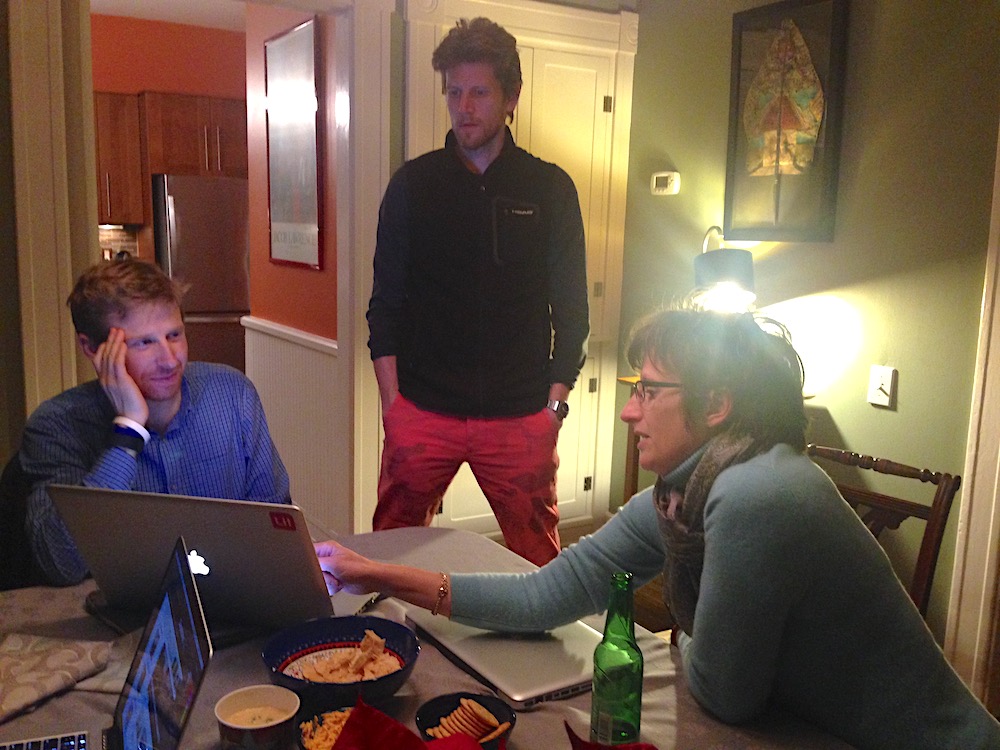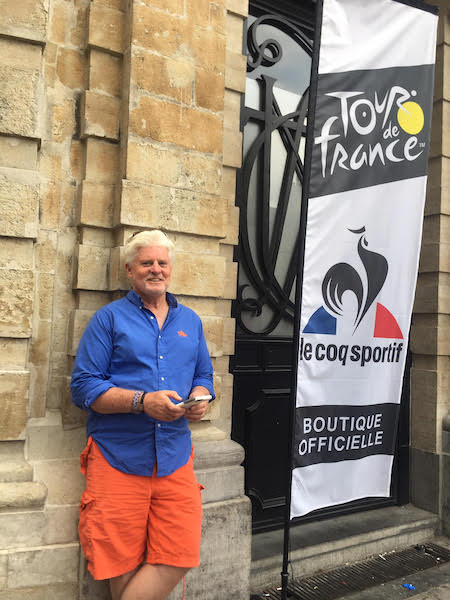This has been eating at me for weeks, but I couldn’t really find the thread to tell you about what it’s like to start a startup in Europe. Till now.
What finally got me going is seeing the accelerating shift away from students coming out of European universities entering the corporate world and toward their jumping into “the startup lifestyle.” Which they imagine as ping-pong tables and beer bongs in the office. Trips to Asia and America to meet investors.
Mega-money on the table.
And it’s all true, especially now that China and the United States are vying for the best startups, competing with a growing number of significant European investors. For example, Amsterdam-based Prime Ventures just invested 14 million euros in Leavy, an app developed in Paris for students who want to rent out their rooms while they travel. Chump change in the U.S., but a sea change in the Netherlands.
If you have a great idea and a great team ready to launch, there’s never been a better time – billions of euros in venture capital are pouring into European startup scene. More than at any time in history.

As for fellow expats, this is probably the best time ever to jump into a tech industry that’s been reliant on highly skilled internationals ever since Andy Grove slipped away from the Nazis and made a beeline to The Valley and Intel’s C-suites.
I’ve been in the startup game since before it was called the startup game and, yeah, I’m addicted … the blue-sky possibilities at the start; the victories and setbacks along the way as you move through the process and the adrenaline rush of redemption (“See, goddamn it, I was right!”) at the exit.
The journey really is the destination. But the process here is completely different than in the U.S.
Europeans depend on brains. Americans depend on hustle. Which is better? I can’t really say. U.S. innovation centers such as The Valley, Boston, Austin – anyplace with a great university, really – pump out a never-ending stream of tech startups.
The Netherlands is new to the game, but a surprising number of globally successful companies have started here in the last few years including Adyen, Booking.com and JW Player.
Full disclosure: Our experience is in the minor leagues. Our most recent company, a pure-play digital media company, Insider Louisville, was a pioneering media effort in its day, but it was in a small market, Louisville, Ky. Our exit was – shall we say – less than $1 billion. But we had fun, made money and, for a while, changed the world. Most importantly, we made our connections across the Midwest, connections we’re using today for Tier1 Tech Talent, our new tech-talent management biz, and Tech Sister Cities, our global capital/talent connector, that are part of Dispatches Media.
Dispatches Europe is far more ambitious than our first (my second) media company – a pan-European media company with a lot of moving pieces. We’ll see how it goes ….
So, I have the bruises, psychic and physical. Here’s my advice to the crazy ones of all ages.
Start at the beginning
This means educating yourself about Silicon Valley and/or the Scandinavian model that produced Skype and TransferWise. Things didn’t happen the way you think they did, and luck was a bigger factor than anyone likes to admit.
But the digital world is built on the work of giants such as Georges Doriot, Niklas Zenström, Tim Bernier-Lee, Gordon Moore, Robert Noyce, Gary Kildall, Jim Clark, Marc Andreessen, Arthur Rock, Eugene Kleiner, Thomas Perkins, Steve Jobs, Steve Wozniak, Tony Faddell and Bill Gates.
If you don’t recognize any of these names, you’re probably in the wrong game. If you do recognize the names, but don’t recognize any of their traits in yourself, you’re probably not the guy or gal.
Is seeing the bigger picture, anticipating trends and understanding how you fit into them is something you really want to do – and are meant to do? If so, go to the next section.
Write the ending first
When Dispatches brought private entity player Jonathan Blue to Eindhoven in 2018, Jonathan told our startup community they have to know their destination before they start the journey. That is, know what sort of exit you want. Are you building a company to sell? To be acquired by – or merge with – an industry stalwart? To take to the public markets?
That decision shapes everything from how much money you raise initially to whom you bring into management. If you’re building a company to sell, you want to hold on to as much of it for yourself and early investors as possible. If you’re building a company with the goal of making it an enduring institution, you’re not going to have a big liquidity event any time soon. You’re in it for the long run, building revenues to the point where your efforts are properly rewarded as a director, chairman or CEO.
If you have a roadmap, open it and proceed to the next section.
It’s all bullshit till it’s not
I spend a lot of time pestering engineers and physicists working in deep-tech startups as to whether their technology is real. Well, I did until an incredibly astute physicist, Emma Wooldridge, looked at me and said, “The science is always real. It’s the engineering that separates the winners from the losers.”
For me, that was an epiphany. Duh … that’s the reason U.S. investors invest in the team, not the concept. Over the years, I’ve seen soooo many ideas that should have worked, but no one could figure out all the big questions from how to tame the technology to whether a market even existed.
So, are you confident enough to really test your idea even if there’s a 95-percent chance of failure? If you are, go to the next section.
It’s not a “lifestyle”
In “Social Network,” Mark Zuckerberg and Eduardo Saverin go from starting The Facebook in their Harvard dorm to partying in The Valley with Sean Parker. Only in Hollywood.
In the real world, you’re in for endless hours of drudgery – engineering, testing, writing code or whatever, then begging people for money.
Everyone has their own motivations.
For example, I’m a big believer in desperation. In my case, I was a 50-year-old ex-military reporter who realized my species was about to go extinct and there was no future that wasn’t digital. So I started my own digital information-delivery service.
I founded Insider Louisville in 2010 with $20,000 from a small group of investors, then we sold it in 2013. I have no idea how we survived those years. My wife Cheryl and I somehow stretched a small amount of savings and went two years without paychecks. Our original developer quit, and several other people in the team either quit or were fired. There were many, many nights I couldn’t sleep because we were that close to disaster until an investor came in and saved the day.
It’s exhausting, scary and humbling … and our experience was better than most. Is this something you really want to do? If so, go to the next section.
Don’t go it alone
For every loner like Jeff Bezos, there are dozens of teams including Jobs and Wozniak, Page and Brin, Zuckerberg and Saverin, Gates and Allen. If you’re a loner and can only work in splendid isolation, you’ll never make it in the startup world.
You’ll need to get along with developers and engineers, some of whom will be crazy as loons. You’ll need taciturn management types. You’ll need pouty creative types and ego-driven marketers.
Your investors will be controlling tyrants, exceeded in their bullying only by your clients.
Think about this: Steve Jobs was infamous for a mercurial management style that swung wildly between inspiring and controlling. He was fired from his own company before he was restored to the throne and became the most disruptive human on earth since Henry Ford and Thomas Edison. What it turned out Jobs was best at was recognizing the genius in others whether it was Wozniak in the early days or Jony Ive at end. He surrounded himself with the very best talent.
So, look in the mirror. If you see Steve Jobs looking back at you, proceed to the next section.
There is no life outside of startups
The biggest problem I see in Europe aside from the lack of early stage capital is that Europeans expect a work/life balance … that they can start a company, then take a month off during the summer followed by quality family time during the major holidays.
Meanwhile, their American and Chinese counterparts are putting in 84-hour weeks. Do the math – twelve hours per day times seven days per week. Ask anyone who’s gone through Y Combinator.
We went from 2010 to 2013 without a day off, much less a vacation. Then, when we took a trip to St. Martin in the Caribbean, I worked out of a tiny borrowed office most of the time we were there. That’s what you do.
If you’re okay with your significant other, wife/husband and kids not remembering exactly who you are, you’re ready to go to the next section.
Things are going to get bloody
Though the investment options are getting better across Europe, you’ll likely end up going to the U.S. for money just like so many of the Dutch companies we know such as Shapeways and JW Player.
Dealing with American investors can be tough. The best will do what they can to help you because it’s in their best interest that you succeed … until it’s not. The rules change all the time.
The worst are amoral and they’ll gut you like a perch. (Read “The New New Thing” by Michael Lewis, which includes sections about how badly Silicon Graphics founder Jim Clark got burned … and how he exacted his revenge, driving one VC to suicide.)
The only thing you can really do to protect yourself is to learn the game. That means mastering an enormous number of new financial terms and concepts such as valuation, convertible debt, tag along/drag alongs and earn outs. My advice – make sure you have a great M&A attorney to guide you through the investment madness … someone you can really trust. We did and despite the $300 per hour billings, it was the best decision we ever made.
Still, you need the capacity and desire to learn the lingo so no one can steal your company. Because that’s what a lot of investors want to do.
If you’re ready to go to war, proceed to the next section.
It’s not about the money because the money can mess you up
I’ve never known anyone who set out to get rich quick and actually made it. All the successful people I know started out doing what they love, then woke up rich one day.
Our Insider Louisville investor, serial entrepreneur Tom Cottingham, once told me the day I sold my company and realized my dream would be the saddest day of my life. He was wrong, but not by much. I had built IL to sell. But what I didn’t anticipate was the effect money pouring in can have on you psychologically.
I can say this … it didn’t make me happy. When you sell your company, you rarely get a lump sum. You get paid out over years. So every quarter we’d get a five-figure check. This is going to sound weird, but I never saw one. Never touched it. Money for me wasn’t the payoff. Building a successful company was the payoff.
Final word on the money: A lot of people go on a shopping binge. We bought a used Honda and placed the rest of the money with a wealth management firm. Nothing changed.
If that’s you, go to the next section.
You won’t be there at the end
In 1985, Jobs and Wozniak could get a few thousand dollars from Arthur Rock and Mike Markkula, then start a computer company. A computer company that went from a garage in Los Altos to a billion-dollar capitalization in five years.
In 2020, you’ll need to raise not millions but tens of millions over the course of even the most modest startup. If you’re in deep-tech, you could need billions.
The odds that your project will become the next Intel, Microsoft or Google are very long. It’s far more likely Intel, Microsoft or Google will snap you up. And when that happens, be ready to do a Travis Kalanik and head out the door.
As Michael Corleone would say, “It’s not personal. It’s business.” But if you’re cut from the same cloth as Yahoo co-founder Jerry Yang and just cannot let go of your baby, then you’re in the wrong business.
Oh yeah, did I already tell you this? I got fired from my own company. The next day, I started putting together the plan that’s now Dispatches Media.
If you, like me, don’t have a sentimental bone in your body and your identity isn’t wrapped up in your baby, congratulations … you’re the guy/gal.
Read more about startups and tech here on Dispatches.

About the author:
Terry Boyd is co-founder of Dispatches Media, based in Eindhoven, Netherlands. Boyd has been a military reporter, business reporter and an entrepreneur, founding Insider Louisville, a pure-play digital news platform, in 2010.
Boyd & Family are long-time expats and have lived in Turkey, Germany and the Netherlands.
Co-CEO of Dispatches Europe. A former military reporter, I'm a serial expat who has lived in France, Turkey, Germany and the Netherlands.















